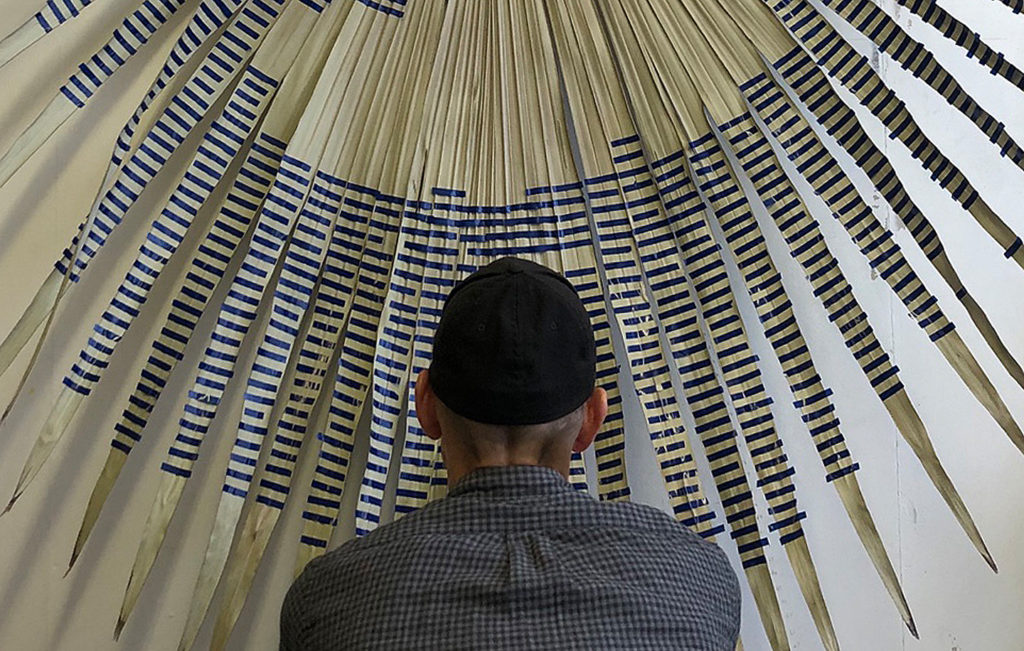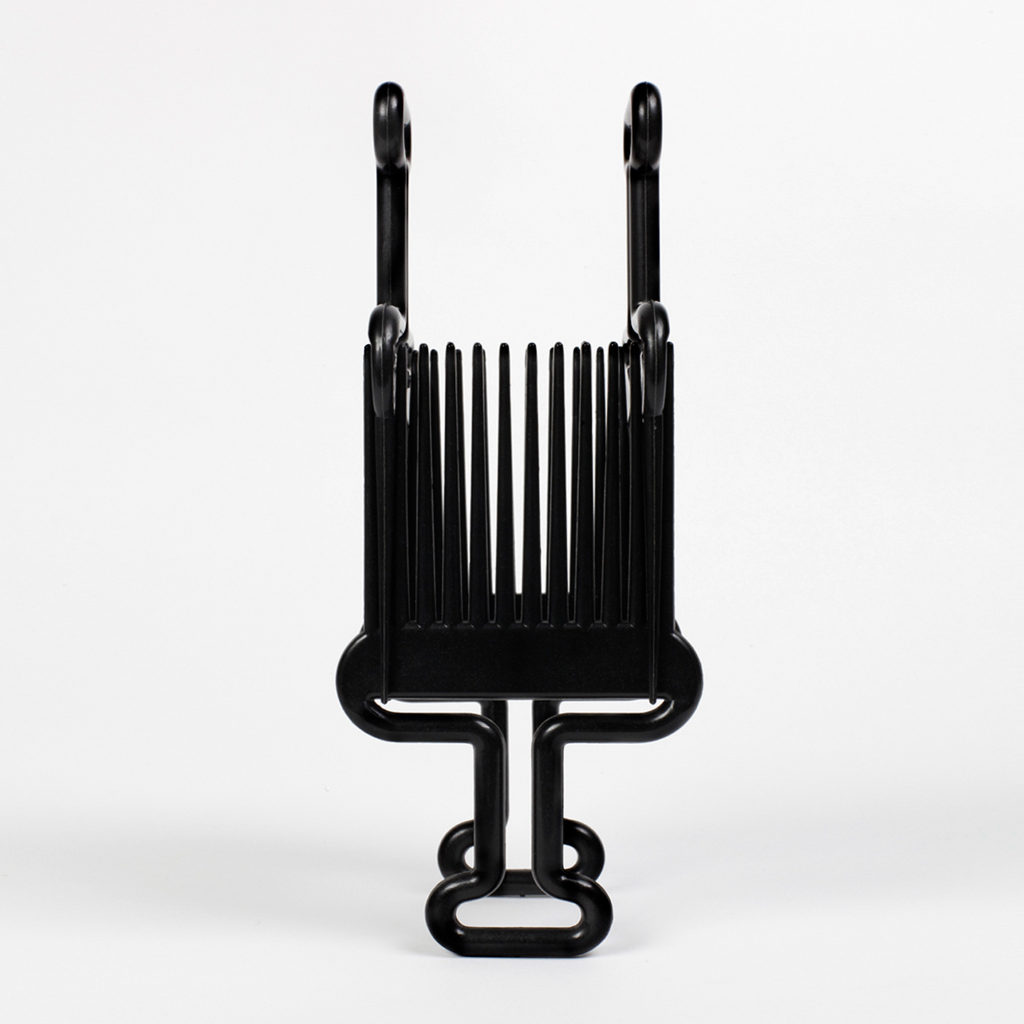A conversation between Marsha Pearce and Blue Curry

Marsha Pearce: Hi Blue, how are you? How have you occupied your time during lockdown?
Blue Curry: Hello Marsha, good to hear from you. Let’s just say that I’m in a better place now than at some other moments over the last 3+ months of lockdown here in the UK. I’ve seen frustrating phases of complete inactivity, chased by grandiose DIY projects (that I mostly finished) and I even fell into the lockdown baking trend – I’ve discovered I inherited some pretty mean rum cake skills from my grandmother! I’m really thankful that I took up running a few years back, as those morning runs out into the Hackney marshes kept me sane. When restrictions started to ease up, I could get into the studio, which gave me back a routine so, lately I’ve had some surprisingly productive days preparing the work for the MOCA online project and starting a few new sculptures.
Yes, let’s talk about your work for MOCA. Your artwork, specifically your ongoing Untitled (hair combs) series, was featured for the month of June, as part of the Museum of Contemporary Art (MOCA) London’s web exhibitions for 2020. You have been working on this series since 2013. Given your sustained engagement with this work, how have your ideas about space, shape, and material relationships deepened over time? What keeps you returning to this body of work?
It’s not that I return to this body of work, I never really leave it. I’m a collector by nature so the hunt for materials, whether on a street market in Sri Lanka or via the internet (as it has been recently during lockdown), is an ongoing one. As you know, I sometimes make projects that can take years to develop or create works that are meticulous, repetitive and extremely time consuming. This series of sculptures, in comparison, gives a bit of levity to my art practice and process as they are both quick and easy to make. The relative ease of making them doesn’t mean I’m not doing heavy lifting when it comes to thinking about form, colour, materials and display though. It’s difficult to explain but the sustained engagement with this work continues to satisfy me and it becomes more substantial and solid to me as sculpture as time goes on.

You’ve got a keen eye for everyday, commonplace objects – using them to create a sophisticated language to reflect on ideas of the familiar and the exotic, the foreign and the native, the known and the unknown. How are you using your way of seeing to navigate our new, everyday experiences; a context in which the commonplace has shifted?
Yes, there has been a shift in what people are now finding fascinating and exotic because of the lockdown limiting their movement. Suddenly great distances have opened up between us and the things that used to be easily accessible. People have been forced to consider what might be just an arm’s length away, rather than a world away. Thus, the mundane has taken on an air of exoticism. I’ve always been interested by this sort of domestic exotic that tends to go unnoticed, so it has been quite interesting for me to watch other people suddenly seeing their immediate environment through my lens. After months of being secluded at home, I like to imagine a first visit to a big shop with its shelves and shelves of chocolate bars and shampoos etc. might invoke a sense of awe akin to Victorians peering into a cabinet of curiosities full of shrunken heads and animal bones brought back from far off lands. In this way, I wasn’t surprised at all when the Nike flagship store on Oxford Street reopened and customers were so desperate to get in that they used force to overwhelm the security guards, even though there were no sales or special promotions on.
Your practice includes a look at tourism. That’s a critical topic for the Caribbean, which depends, in many respects, on the leisure industry. The pandemic has already had an impact on tourism in the region. An article in The Tribune reports the Bahamas “stands to lose $2.7bn in tourism revenues if the COVID-19 pandemic shuts down stopover visitors for the rest of 2020.” How are you now processing ideas about travel, pleasure trips and tropical escapes? What are the implications of these ideas for your art practice?
Tourist economies in the region – like The Bahamas’ – will be hit hard for the moment but tourism will bounce back as it always does. I would say that if anything, the desire to travel and ‘escape’ has been magnified by the shutdown. UK ‘air bridges’ (routes between two countries where Covid is under control) have just opened and people are booking and travelling already. Experts expect beach destinations will recover tourist numbers faster than city destinations – good news for the Caribbean economically but let’s hope this pause might invoke a rethink about tourism dependency and ‘over tourism.’ It’s interesting to me how things come full circle; Bahamian tourism began in the 1800s by persuading those suffering from respiratory disorders and other illnesses to come to Nassau for a ‘change of air’ to revive their health. I expect that a similar touting of the health benefits of the islands will happen again – selling a ‘Covid-free paradise.’ Initially, precautions will mean that tourism will operate a bit differently and I’m imagining that a no-tan-lines face mask made of ‘tan thru’ fabric will become the new must-have item for Covid-careful tourists.

This pandemic context has made it difficult to see beyond a few days, a week perhaps – everything is incredibly unpredictable. Are you able to look ahead? You are scheduled to participate in exhibitions in 2021? Tell me about your preparations for forthcoming shows.
Yes, for me it became a question of: “What happens when there’s no carrot on the end of the stick to chase after?” In the first week of lockdown everything I had coming up was cancelled or postponed. Once I was able to pull myself out of that tailspin, I found the situation refreshing in that I had no pressure on me to make work for an exhibition deadline. I was making to satisfy myself and not an audience. It was a good reminder that you should always let the work push you forward, rather than outside forces and voices. Don’t get me wrong, there is anxiety regarding what this extended Covid future will bring professionally, but I’m feeling optimistic. Just recently, it was confirmed that the postponed iteration of the Small Axe, The Visual Life of Social Affliction exhibition I’m in at TENT in The Hague will be opening on July 10th. Also, an amazing exhibition opportunity for 2021 has come up, which I can tell you more about once it’s finalised. Overall, I think Covid and the lockdown have made most of us rethink our metaphorical carrots, which makes this quite an exciting moment.
Stay connected with Blue Curry:
Instagram: @blue_curry
Website: www.bluecurry.com

Comments are closed, but trackbacks and pingbacks are open.